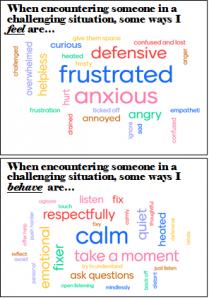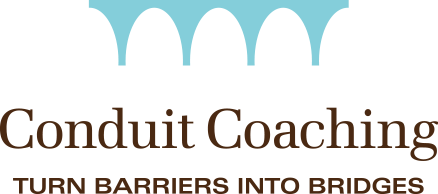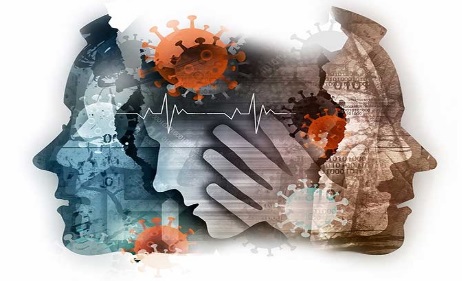In conversations with folks across levels and sectors, I hear everyone up and down org chart levels is struggling.
Makes sense.
The past year’s events have taken a toll on all of us.
No one’s escaped untouched.
Emotional Scrabble
 I’m reminded of word clouds created during a recent virtual training with 50 leaders.
I’m reminded of word clouds created during a recent virtual training with 50 leaders.
We were talking about feelings that often came up when we found ourselves in challenging interpersonal situations.
As complex beings, we experience a range of emotions in those circumstances, depending on a range of variables. (Are we rested or tired? Fed or hungry? What’s our history with this person? Is the moon in Aquarius? etc.)
In turn, these emotions lead to a range of possible behaviours, including some that aren’t so pretty, though completely normal given we’re mere mortals.
These leaders made it clear: We all aim to consistently respond in a productive way.
We just don’t always succeed; everything piled on by COVID and the range of impact it’s had on our team members and clients can make it really, really hard.
Ugh.
And . . . there is hope.
Caring Cousins
Using brain scans, neuroscientists can actually see and distinguish two likely sources of our response behaviors in those difficult situations: empathy and compassion.
Same thing? Twins? Not so much.
Cousins? Yes.
Empathy is recognizing and connecting with another’s emotions—feeling their feelings.
Compassion, in addition, compels us to help them.
Why does this distinction matter?
Brain scans show that our hard-wired human response to the suffering of others is empathy.
But from there, says neuroscientist Olga Klimecki, we have two options.
Door #1
Empathic distress (Dr. Klimecki’s term). It triggers our neurological pain matrix. We take on the weight of others’ emotions, so their distress becomes our own.
The results: We get sucked into negative emotions or develop a savior complex.
Ugh.
Either way, we’re focused on satisfying our own need for things to be better.
Empathic distress doesn’t feel good, and it often leads to unproductive behaviors.
And yes, it does weaken our connection with others—even the folks we’re trying to fix help. Not good.
Door #2
Compassion. We feel emotion toward others (like care, concern, generosity) and we take action, using positive, productive behaviours, to support them.
Bonus: Compassion for others also benefits us.
In a meta study of existing research, physician/scientists Stephen Trzeciak and Anthony Mazzarelli discovered that practicing compassion offers doctors a positive experience that:
- Increases work fulfillment, and
- Builds resilience and resistance to burnout.
But wait. There’s more!
Gallup studies also indicate that how we experience our workload has a stronger influence on burnout risk than the amount of work assigned. Huh.
Keys to Door #2
As we venture into the “next normal”, experiment with tools that make it easier for you and your teams to choose Door #2 when confronted with others’ suffering.
Here’s how . . .
- Awareness 1.0: Be clear about factors that increase the likelihood of empathic distress (fatigue, hunger, etc.) and prepare accordingly.
- Awareness 2.0: Recognise signals that you’re opening the empathic distress door. For example, feeling like you have to fix the problem, or falling into negative thinking.
- Mindfulness: Experiment with stepping back and observing your experience versus getting sucked into it.
- Self-Compassion: Feeling empathic distress is also suffering. Offer yourself compassion in those moments. It’s like putting on your oxygen mask first.
- Support. Feeling supported is a research-proven antidote to opening Door #1. Brainstorm with colleagues about how you can support each other in those moments.
From Distress to Resilience
Yes. Of course. The past year’s events have been a breeding ground for empathic distress. On top of that, who knows what’s waiting for us as we continue this journey?
And. To channel Oprah’s “What I know for sure” . . .
Knowing #1. Humans are not only fallible, but resilient and compassionate, even (and especially) in challenging times.
Knowing #2. We’ve got it in us to align our response behaviours with our better selves.
Wishing you all of that in the weeks and months to come.
In gratitude,
. . . Mary Ellen (ME)
Especially for Leaders & Teams in Seniors Care.
Not surprisingly, whenever we’ve launched a new Seniors Care Leadership Academy over the past 13 months for Seniors Care organizations, COVID concerns—fatigue, overwhelm, fear—have come through loud and clear among participants.
Of course.
Though everyone has been affected by the past year’s events, Seniors Care has had more than its fair share of pain.
Even with the vaccine making a tremendous difference in the incidence of COVID in Seniors Care, many staff and leaders are understandably still grappling with the after-effects of the past year. On top of that, people attracted to Seniors Care are often, innately, helpers. They take on the burden and stress. A recipe for empathic distress if there ever was.
Ouch.
Would learning more about how to navigate empathic distress, and even how to consistently act from compassion instead, be helpful for you and/or your team? Cuz you’re not alone.
This is exactly what we were teaching Seniors Care leaders and teams before 2020, and even more so over the past 13 months. They keep telling us it’s made a difference. Leaders report being more calm, grounded, resilient, and self-aware, while seeing similar shifts in their teams.
We’re here if you and your team wants some of that too. Reach out for a chat.







